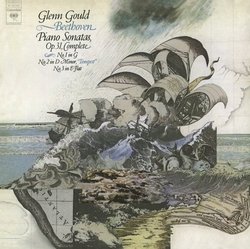| All Artists: Glenn Gould Title: Beethoven: Piano Sonatas, Op. 31 Complet Members Wishing: 0 Total Copies: 0 Label: Sony Bmg Europe Release Date: 9/3/2007 Album Type: Import Genre: Classical Styles: Chamber Music, Historical Periods, Classical (c.1770-1830) Number of Discs: 1 SwapaCD Credits: 1 UPC: 886971482928 |
Search - Glenn Gould :: Beethoven: Piano Sonatas, Op. 31 Complet
CD Details |
CD Reviews"The World of Early-Romanticism..." Sébastien Melmoth | Hôtel d'Alsace, PARIS | 10/06/2008 (5 out of 5 stars) ".
"In these three works of Opus 31, the piano sonata enters the world of early-Romanticism [with its] poetic and evocative qualities. All three speak a new language, each presenting a new and original mode." (Lockwood) Opus 31 was composed in 1802 when Beethoven's aural malady was becoming alarmingly obtrusive, forcing his abrupt withdrawal from Viennese aristocratic society. No. 1 [G-major] maintains his youthful charm: especially notable is the wistful :09 Adagio grazioso featuring extensive trilling effects which presage his late Sonatas (cf. Op. 110). No. 2 [d-minor] is yet a more seriously philosophical work with a great deal of atmosphere. The :07 opening Largo-Allegro premieres a sense of "becoming" which would be most fully revealed in the Ninth Symphony. The :09 Adagio (Bb) features Beethoven's lyrical expressiveness with interesting keyboard effects. The haunting and hectoring Allegretto is justly famous--(something like a "Für Elise" on steroids): heroically indignant. GG takes no repeats, thusly effecting a thrilling tour de force conclusion. No. 3 [Eb-major] begins with a certain joyeuse Allegro which presages Wagner's later suspension of tonality with postponement of harmonic resolution. The Moderato e grazioso effects Beethoven's noble hymn-like melody. The Presto con fuoco is typically "unbuttoned" Beethoven at his cheeriest. Gould's miraculous durée--his cognitave time-keeping--combined with his incredible digital technique, are apparent throughout. A very satisfying programme. . Glenn Gould plays Beethoven Piano Sonatas: Moonlight, Pathetique, Appassionata Beethoven: Piano Sonatas Nos. 24 "À Thérèse" & 29 "Hammerklavier" Beethoven: Piano Sonata No. 30; Sonata No. 31; Sonata No. 32 . Beethoven: The Music and the Life Beethoven: His Spiritual Development ." |

